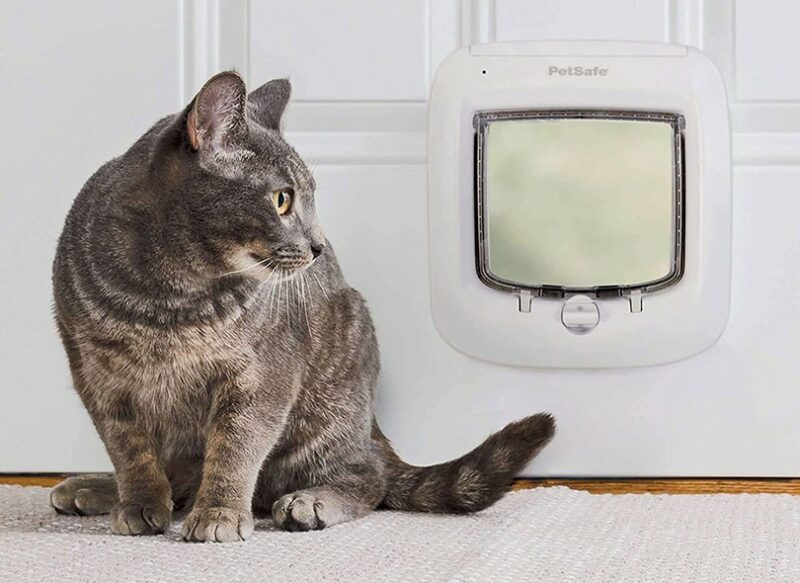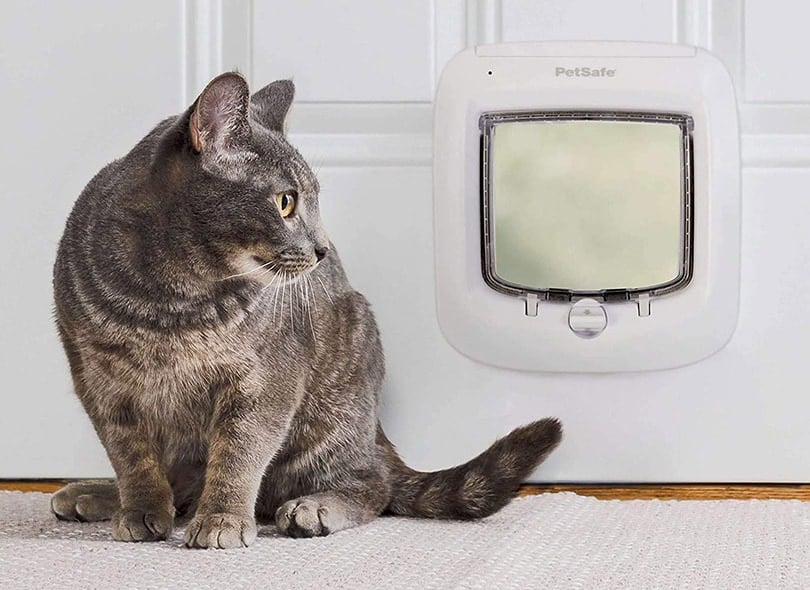
However, they’re pricier than regular cat doors, and they may require you to do a little carpentry on your home to install them. As a result, this is a decision that you don’t want to get wrong.
Luckily, we took an in-depth look at the best options on the market today, and in the reviews here, we show you which ones are worth the investment.
A Quick Comparison of Our Favorites of 2024
| Image | Product | Details | ||
|---|---|---|---|---|
| Best Overall |

|
High Tech Pet Power PX-2 Electronic Pet Door |
|
CHECK PRICE |
| Best Value |

|
PetSafe Microchip Activated Cat Flap |
|
CHECK PRICE |
| Premium Choice |

|
SureFlap Microchip Cat Door Connect with Hub Bundle |
|
CHECK PRICE |
| Best for Kittens |

|
Cat Mate Elite Microchip Cat Flap w/Timer Control |
|
CHECK PRICE |

|
PetSafe Electronic SmartDoor |
|
CHECK PRICE |
The 8 Best Electronic & Automatic Cat Doors
1. High Tech Pet Power PX-2 Electronic Pet Door — Best Overall

| Dimensions: | 18” x 6” x 47” |
| Power: | AC with battery backup |
Unless you own a leopard or something like that, the High Tech Pet Power Door PX-2 is likely to be much bigger than your cat needs. However, it’s still the best option that we found, earning it the title of best overall electronic & automatic cat door on the market.
It’s designed for dogs to use too, and since it can accommodate a 100-pound pooch, your cat shouldn’t have any issues wriggling through. It’s electronically activated, so all you have to do is put a special collar on your cat and the door will open whenever they approach.
There’s a special directional sensing system that only opens the door when your cat is clearly intending to leave, so it shouldn’t come up if they’re just loitering around the thing. You can also set it to only allow the cat in, only allow them out, allow them to come and go, or be completely locked.
When locked, it’s wind- and weather-proof, and there’s a deadbolt that you can use to keep unwanted visitors out.
It’s a bit cumbersome to use, though, mainly because the manufacturer is not lying about it being “high-tech.” Your Wi-Fi has to be up and running for it to work, and you can only control it with the dedicated app.
That’s a small price to pay for a door that works so effectively, though, and you’re unlikely to be disappointed with the High Tech Pet Power Door PX-2.
- Large enough for any breed
- Directional system opens when cat approaches door directly
- Four different lock settings
- Wind- and weather-proof
- Deadlock keeps unwanted visitors out
- High-tech nature can be a pain
2. PetSafe Microchip Activated Cat Flap — Best Value
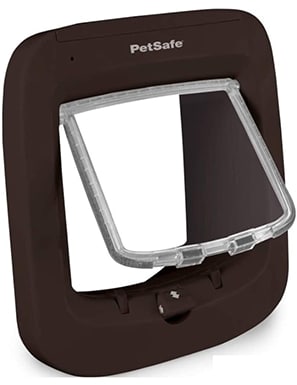
| Dimensions: | 9.41″ x 8.66″ x 4.8″ |
| Power: | Battery |
If you want an effective door that gets the job done at a budget-friendly price, the PetSafe Microchip Activated Cat Flap is the best electronic & automatic cat door for the money.
It works by detecting the microchip on your cat, and it can be programmed to recognize as many as 40 cats, so even the biggest cat lovers will be adequately served by its abilities.
The flap only opens for cats coming in from outside; any animal that’s inside the house will be able to exit through the flap unless you manually lock it. This gives your cat free rein of the house and yard without letting a ton of other animals in too.
It’s battery operated, so there’s no need to run a power cable anywhere, and it will alert you once the cells are getting low.
The whole thing is small and unobtrusive, so guests and neighbors may not even notice that you have it. While that will prevent it from marring your existing décor, it also means that it’ll be a bit cramped for large cats.
It’s also not compatible with all microchips, so check to make sure it’ll work for your cat before you buy it. If it does work for your cat, we’re betting that you won’t regret buying the PetSafe Microchip Activated Cat Flap.
- Good value for the price
- Works with cat’s microchip
- Gives pets free rein of house and yard
- Small and unobtrusive
- No need to run a power cable to it
- May be too small for larger breeds
- Doesn’t work with all microchips
3. SureFlap Microchip Cat Door Connect with Hub Bundle — Premium Choice
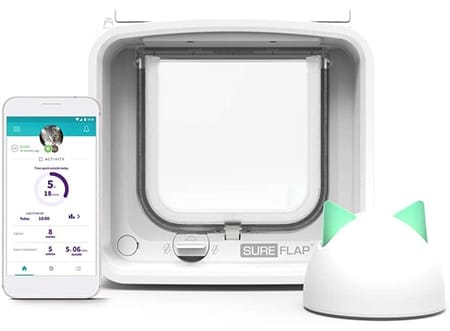
| Dimensions: | 5 5/8” x 4 ¾” |
| Power: | Battery |
The steep price tag may be off-putting to some, but no one can accuse the SureFlap Cat Door Connect of not providing plenty of bang for the buck.
This machine looks for microchips, but it searches for your cat’s unique chip, ensuring that they’re the only ones that can use the flap. It also has a companion app that enables you to control the thing from anywhere, so you can let your cat out from halfway across the world.
You can also change their exit permissions or simply be made aware of their comings and goings via the app. This gives you plenty of information over what your cat is doing and when, as well as control over their activities.
While the app is good, it’s still an app, which means it can glitch from time to time. You may not want to trust it if you’re not in the area.
Since it’s geared toward individual microchips, you can also set it so that one cat can go outside while another stays in. Also, if your cat isn’t chipped, you can put one of the brand’s RFID collar tags on them and everything will work just fine.
The SureFlap Cat Door Connect is an excellent, high-tech, and expensive option. It’s a great choice for anyone who can afford it, but you can get doors that are equally good for less money.
- Recognizes each cat’s unique microchip
- Can control it via app
- Alerts you to cat’s activities
- Possible to allow certain cats out while keeping others in
- Can use a collar for cats that aren’t chipped
- Expensive
- App occasionally glitches
4. Cat Mate Elite Microchip Cat Flap w/ Timer Control — Best for Kittens

| Dimensions: | 9.75” x 5.7” x 10.5” |
| Power: | Battery |
The Cat Mate Elite can be mounted in a door or wall, giving you plenty of options when it comes to placement. You can put it in a place where even the smallest cats can reach it, making it a good choice for kittens.
The flap is light enough that cats of any size should be able to muscle through it yet substantial enough that it should keep the wind and cold out of your house. The flap is also transparent, enabling your cat to look for danger before exiting.
This also makes it less secure than we’d like. Since the flap is made of flexible plastic, determined outsiders — like, a hungry raccoon — can pry it open to gain entry.
It can recognize up to nine different microchips, but you can also take full control over the machine with its timer function. That enables you to override the chip if you like, so you can set the door to do things like not opening at night if you want.
It’s easy to set the timer, due in large part to the clear LCD indicator on it. That’s good because the included instructions are no help at all.
If you have tiny cats in the house, the Cat Mate Elite is worthy of consideration. It’s not quite as good overall as some other options, though.
- Can be placed in both doors and walls
- Flap is light enough for cats to move but won’t let weather in
- Transparent flap lets cats scan for danger
- Easy-to-use timer function gives you complete control
- Flap can be pried open by raccoons
- Operating instructions aren’t helpful
5. PetSafe Electronic SmartDoor

| Dimensions: | 27″ x 16.1″ x 23.6″ |
| Power: | Battery |
In order to use the PetSafe Electronic SmartDoor, a cat needs to have a SmartKey on their collar; this enables you to easily configure which cats can come and go, while ensuring that all other animals stay out.
It can work with five different SmartKeys, so you can outfit your entire menagerie without worrying about setting up custom controls. You can also lock it or set it to lock automatically at certain times.
The sensor has a range of up to 3 feet, but you can adjust it if you don’t want it to open while your cat’s that far away. That range is a bit of a suggestion, though, as sometimes, the door unlocks when the cat’s 15 feet away, and sometimes, it doesn’t open even when the cat is right next to it.
Part of that may have to do with the surface that the door’s installed on. Metal seems to block the signal, so be careful about placement.
The door is made of extremely rigid plastic, so once it’s locked, nothing’s coming in or going out. However, if you have a long-tailed cat, that might make you nervous because the flap can slam shut — and it won’t necessarily wait for all parts of your cat to exit first. It’s unlikely to cause serious injury, but suffice it to say that cats don’t appreciate it much.
The PetSafe Electronic SmartDoor is a good, highly secure option, but there are still a few kinks that the manufacturer needs to iron out.
- Easy to use with collar-attached SmartKeys
- Sensor has range up to 3 feet
- Can be set to lock automatically
- Door is made of secure plastic
- May shut on long-tailed cats
- Sensor is a bit glitchy
- Metal may interfere with unit’s ability to function
6. Perfect Pet Electromagnetic “E” Cat Door

| Dimensions: | 7” x 9” |
| Power: | Battery |
The Perfect Pet “E” works via a sensor attached to your cat’s collar, so your cat can come and go as they please without needing any subcutaneous surgery.
The door is covered by a transparent LEXAN flap that’s completely rigid and unbreakable, so you don’t have to worry about raccoons or burglars worming their way through it. Of course, that also means if it malfunctions and your cat gets locked out, they won’t be getting in either.
The flap is transparent, enabling your kitty to get the lay of the land before they stick their neck out.
The sensor is weak, though, so your cat will need to get right up next to the door for it to open. This may discourage some cats from using it at all, which makes it harder to teach them to go in and out.
It’s big enough for a 25-pound pet, so it should accommodate most cats, but if you also have dogs in your house, you may need something more substantial.
The Perfect Pet “E” is a good solution for most cats, but you’ll need to keep looking if you want something that can also work with other animals.
- Unbreakable plastic flap
- See-through door lets cats assess danger
- Large enough for most cats
- Cat won’t be able to get in if locked out
- Too small for large pets
- Cat has to get right next to it for sensor to work
7. PetSafe Interior and Exterior Cat Door
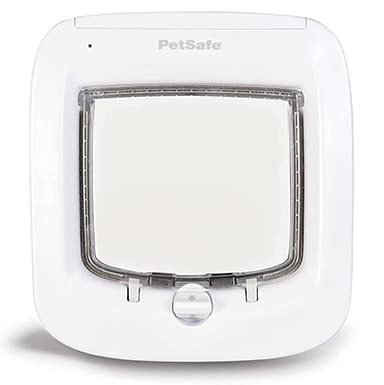
| Dimensions: | 4.8” x 8.6” x 9.4” |
| Power: | Battery |
If you want to keep your cat out of certain rooms in the house, the PetSafe Interior and Exterior can be installed either inside or outside.
It fits almost any kind of door, and installation is fairly simple — it’s easy enough that you should be able to do it yourself. However, if you’re trying to put it in metal, glass, brick, or a wall, you’ll need to purchase extra gear to make it work.
There’s energy-efficient weather stripping along the edges to keep the cold at bay, and there are two magnetic strips that keep it closed. Those magnets make a loud clicking sound every time that they lock or unlock, and it’s enough to scare some skittish cats away, so be careful.
The fact that it’s only secured in two places also means that certain other animals (like raccoons) can pry it open if they’re determined enough. It’s fairly small to boot, so cats over about 10 pounds may struggle to wriggle through.
The PetSafe Interior and Exterior is your best bet for indoor use, but you can find better options if you want something to let your cat outside.
- Can be installed indoors or out
- Easy to put in
- Weather stripping keeps cold from getting in
- Installing in certain surfaces requires special gear
- Magnets make loud noise that can scare skittish cats
- Raccoons can pry it open
- Too small for large breeds
8. SureFlap Microchip Cat Flap
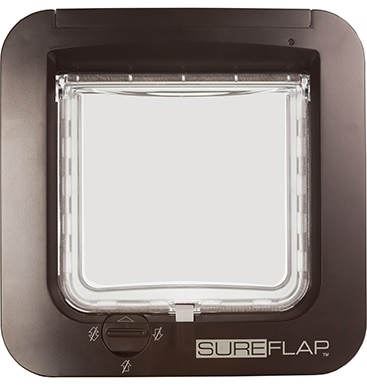
| Dimensions: | 4.75” x 5.6” |
| Power: | Battery |
The SureFlap Microchip uses an RFID reader to sense your cat’s microchip, and it works with over 30 different types of chips.
It can be installed in windows, doors, and walls, so you can put it anywhere that’s convenient for you and your cat. It’s battery powered, so you don’t have to worry about putting it near an outlet, and there’s a light that will flash red whenever the batteries need to be replaced (which should be about every year or so).
It shuts securely after your cat leaves, with no flapping or gaps or anything like that. However, the sensor is a bit weak, so your cat will need to practically rub up on this thing to open it. When it does open, though, it stays open for a few seconds, which is enough time for another animal to slip through.
The machine can store 32 different microchips, but there’s no way to program which chips you want it to recognize. That means another chipped cat can use it, and you can’t keep some cats inside while letting other cats leave.
It’s not a great choice for places with messy weather either. The sensor needs to be completely clean for it to operate properly; if it gets smudged or dirty, your cat may get locked out.
The SureFlap Microchip is a versatile option that definitely closes tightly, but it has other problems that may get annoying quickly.
- Works with 30 types of chips
- Closes securely without flapping
- Sensor is weak
- Stays open for a few seconds each time that it’s activated
- Can’t control which cats are stored in the program
- Sensor needs to be clean to work
Buyer’s Guide – Choosing the Best Electronic & Automatic Cat Doors
Automatic cat doors aren’t the most complicated pieces of machinery in the world, but if you’ve never dealt with one before, you may not know what to look for while shopping around. In this guide, we go over the questions that you should ask yourself before making a purchase.
Why Do I Need an Automatic Cat Door?
Automatic cat doors are definitely a step up from the old-school models, and they offer a few clear advantages that may make it worth your while to upgrade.
The first is convenience. You can set the door up to automatically recognize your cat and open when they approach, then lock when they leave. This saves you from constantly having to secure the door when your cat leaves, and many also have apps that let you control the door remotely.
Due to this, they’re also more secure. If you don’t manually lock a regular cat door, then other cats, stray dogs, or random animals like raccoons can just waltz into your living room and make themselves at home. While not perfect, automatic doors drastically reduce the likelihood of this happening.
That can also make them safer for your cat. If your cat gets in a jam and needs to run to safety, they can scurry through the door without having to worry about a predator or angry rival following them inside.
Finally, automatic doors are more energy efficient. They’ll seal shut when not in use, rather than flap in the breeze, so cold air won’t get in during the winter months or out during the summer. You won’t have to worry about dirt and debris flying in while you’re trying to eat either.
What Are the Drawbacks to Owning an Automatic Cat Door?
While they’re definitely a step up from their manual cousins, automatic cat doors aren’t perfect, and there are a few drawbacks that you should be aware of before you make the switch.
The biggest is the added initial expense that you’ll incur. These doors are much more expensive than regular cat doors, and that cost goes up the fancier you get. We think that they offer more than enough value to compensate for the expense, but you may disagree.
Electronic cat doors are also more complicated. Some require setting up Wi-Fi and phone apps, and they all either use your cat’s microchips or special sensors that you attach to their collars. There are more moving parts to deal with, each of which can fail at any time, and it’s enough to make tech-phobic people run for the hills.
Assuming that you can afford one and you’re not afraid of doing a little tech work, though, switching to an automatic cat door will likely be a decision that you won’t regret.
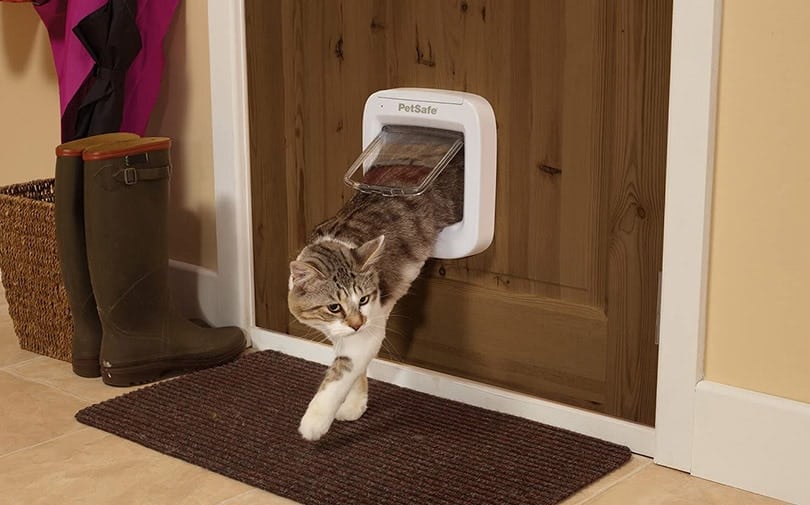
How Does an Automatic Cat Door Work?
Most automatic cat doors have a sensor that detects your cat’s existing microchip or a special tag that you can place on their collar. As the cat approaches the door, the sensor receives a signal that lets it know to unlock and open the flap.
Many also have other options, like completely locking the flap regardless of whether the cat wants to leave or setting things on a timer. Some also enable you to assign special permissions to different cats, which comes in handy if you want your Siamese to be able to go outside while your Sphynx stays indoors.
Can I Install an Automatic Cat Door Anywhere?
That depends on the cat door. Some can be installed in doors, walls, or windows, while others can only be installed in doors. It all varies, so check the model that you’re considering before you buy.
Many can only be installed in doors out of the box but will have special add-on packages that enable you to install them in other places. Just be aware that the time, expense, and difficulty involved in such an installation will probably increase dramatically.
How Hard Are They to Install?
That will vary from door to door, as well as where you’re trying to install it.
Most are fairly simple to put in, and if you’re relatively handy with tools, you should be able to do it on your own. However, if you’re trying to install a cat door in a surface made of glass, metal, brick, or something similar, you might want to call in a professional to help.
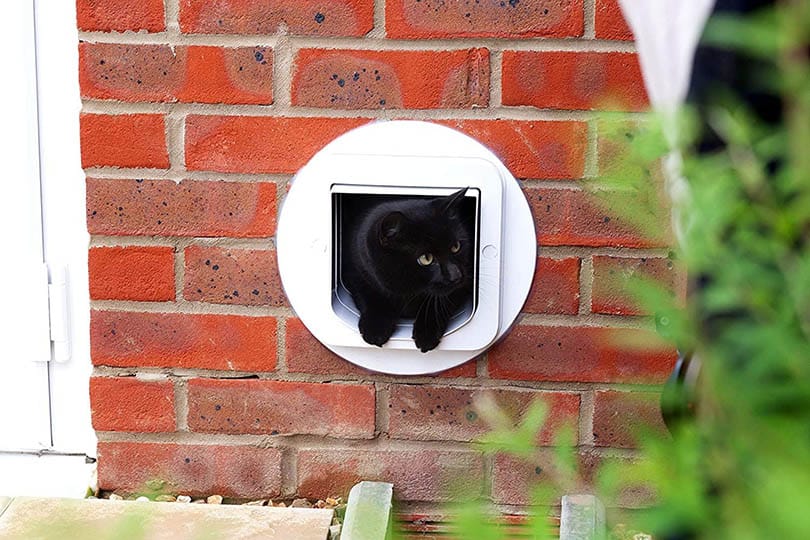
How Secure Are Automatic Cat Doors?
That depends on the door and what you’re trying to keep out.
Some have flaps made of flexible plastic; these are suitable for keeping out other cats, dogs, and similar large animals, but don’t be surprised if raccoons and bugs can find their way through.
Others have doors or flaps made of sturdier materials. These stand a better chance of keeping all animals out, so if you’re worried about intruders, that’s the way to go. Virtually all cat doors have deadbolts or similar locks that should make them inaccessible to other animals, though.
Now, if you’re worried about stray humans making their way in through the cat door, then you might have reason to be alarmed. Most cat doors will form a weakness in your home defense, but not much more than, say, a window. Also, if you get a large door, burglars may assume that it means you have a big dog — and that can make your cat door a deterrent rather than a weak spot.
One thing to be aware of, though, is that most cat doors are big enough that infants and toddlers can make their way through (even if they’re not microchipped), so be sure to watch your kids around the doors at all times.
Conclusion
The High Tech Pet Power Door PX-2 is our favorite automatic cat door because it has plenty of customization options and a sensor that’s secure and reliable. For a cheaper model that’s roughly as effective, consider the PetSafe Microchip Activated Cat Flap. It’s small and unobtrusive, and your cat will likely love it.
Buying and installing an automatic cat door isn’t a decision to be made lightly, and we hope that these reviews have made it easier for you to find one that works for your situation.
Just remember: If you buy a lemon, there’s a chance that you’ll come home to find your cat locked outside and a raccoon curling up on your cat tree.
Featured Photo Credit: Amazon
Contents
- A Quick Comparison of Our Favorites of 2024
- The 8 Best Electronic & Automatic Cat Doors
- 1. High Tech Pet Power PX-2 Electronic Pet Door — Best Overall
- 2. PetSafe Microchip Activated Cat Flap — Best Value
- 3. SureFlap Microchip Cat Door Connect with Hub Bundle — Premium Choice
- 4. Cat Mate Elite Microchip Cat Flap w/ Timer Control — Best for Kittens
- 5. PetSafe Electronic SmartDoor
- 6. Perfect Pet Electromagnetic “E” Cat Door
- 7. PetSafe Interior and Exterior Cat Door
- 8. SureFlap Microchip Cat Flap
- Buyer’s Guide – Choosing the Best Electronic & Automatic Cat Doors
- Why Do I Need an Automatic Cat Door?
- What Are the Drawbacks to Owning an Automatic Cat Door?
- How Does an Automatic Cat Door Work?
- Can I Install an Automatic Cat Door Anywhere?
- How Hard Are They to Install?
- How Secure Are Automatic Cat Doors?
- Conclusion


